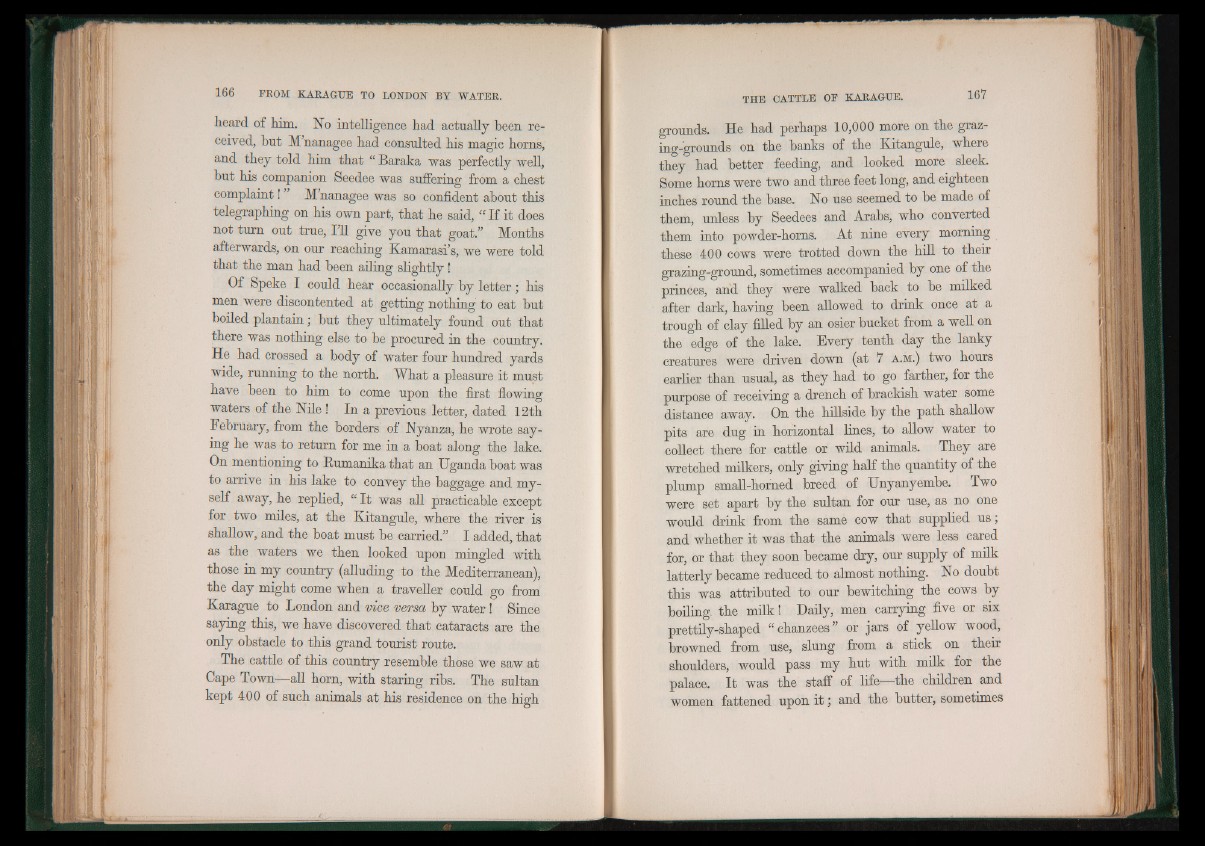
heard of him. No intelligence had actually been received,
but Mnanagee had consulted his magic horns,
and they told him that “ Baraka was perfectly well,
but his companion Seedee was suffering from a chest
complaint! ” M nanagee was so confident about this
telegraphing on his own part, that he said, “ If it does
not turn out true, HI give you that goat.” Months
afterwards, on our reaching Kamarasi’s, we were told
that the man had been ailing slightly!
Of Speke I could hear occasionally by letter; his
men were discontented at getting nothing to eat but
boiled plantain; but they ultimately found out that
there was nothing else to be procured in the country.
He had crossed a body of water four hundred yards
wide, running to the north. What a pleasure it must
have been to him to come upon the first flowin g
waters of the Nile ! In a previous letter, dated 12th
February, from the borders of Nyanza, he wrote saying
he was to return for me in a boat along the lake.
On mentioning to Bumanika that an Uganda boat was
to arrive in his lake to convey the baggage and myself
away, he replied, “ It was all practicable except
for two miles, at the Kitangule, where the river is
shallow, and the boat must be carried.” I added, that
as the waters we then looked upon mingled with
those in my country (alluding to the Mediterranean),
the day might come when a traveller could go from
Karague to London and vice versa by water ! Since
saying this, we have discovered that cataracts are the
only obstacle to this grand tourist route.
The cattle of this country resemble those we saw at
Cape Town—all horn, with staring ribs. The sultan
kept 400 of such animals at his residence on the high
grounds. He had perhaps 10,000 more on the graz-
ing-grounds on the banks of the Kitangule, where
they had better feeding, and looked more sleek.
Some horns were two and three feet long, and eighteen
inches round the base. No use seemed to be made of
them, unless by Seedees and Arabs, who converted
them into powder-horns. At nine every morning
these 400 cows were trotted down the hill to their
grazing-ground, sometimes accompanied by one of the
princes, and they were walked back to be milked
after dark, having been allowed to drink once at a
trough of clay filled by an osier bucket from a well on
the edge of the lake. Every tenth day the lanky
creatures were driven down (at 7 a .m .) two hours
earlier than usual, as they had to go farther, for the
purpose of receiving a drench of brackish water some
distance away. On the hillside by the path shallow
pits are dug in horizontal lines, to allow water to
collect there for cattle or wild animals. They are
wretched milkers, only giving half the quantity of the
plump small-horned breed of Unyanyembe. Two
were set apart by the sultan for our use, as no one
would drink from the same cow that supplied u s ;
and whether it was that the animals were less cared
for, or that they soon became dry, our supply of milk
latterly became reduced to almost nothing. No doubt
this was attributed to our bewitching the cows by
boiling, the milk! Daily, men carrying five or six
prettily-shaped “ ehanzees” or jars of yellow wood,
browned from use, slung from a stick on their
shoulders, would pass my hut with milk for the
palace. I t was the staff of life—the children and
women fattened upon i t ; and the butter, sometimes